Introduction
Custom LLM models are offering tailored AI solutions that drive growth across industries.
Unlike generic large language models, custom LLM models are designed to address specific business needs, enhancing productivity and innovation.
Recent statistics highlight the growing importance of these specialized models: according to a 2023 survey by Gartner, 45% of organizations plan to implement custom LLM models within the next two years.
Building a large language model from scratch allows companies to create unique AI solutions that align perfectly with their objectives.
Examples of custom LLM models in AI include JP Morgan's IndexGPT for financial analysis and Bloomberg's BloombergGPT for market insights. These bespoke models demonstrate the versatility and power of customized AI solutions.
The market for custom LLM models is expanding rapidly, with MarketsandMarkets projecting a CAGR of 21.6% from 2022 to 2027. This growth is driven by the increasing demand for AI solutions that can be fine-tuned to specific domains and tasks.
As more organizations recognize the potential of custom LLM models in AI, we can expect to see a surge in innovative applications across various sectors, from healthcare to manufacturing.
So continue reading to know more about custom LLM models and how it can drive business growth.
How to Build a Custom LLM Model
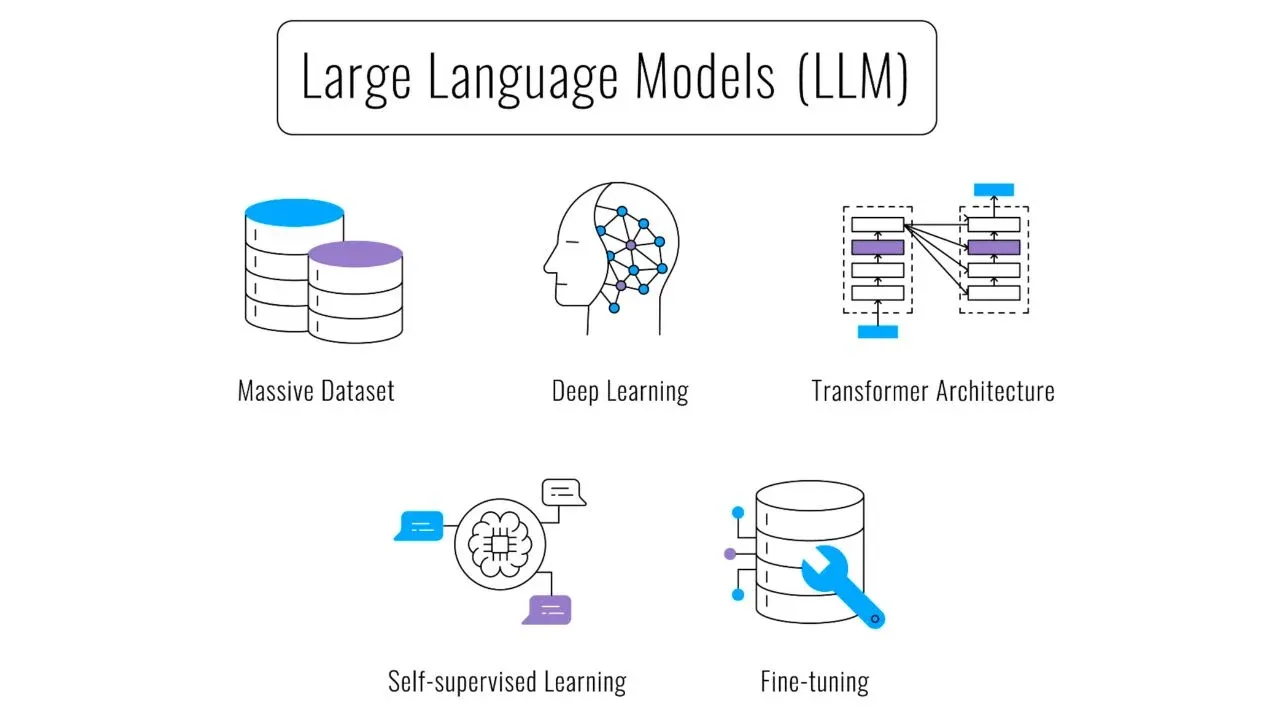
Creating a custom LLM model involves several key steps. Here’s a concise guide to help you understand the process and apply it effectively.
Data Collection and Preprocessing
Data is the foundation of any custom LLM model. Collecting and preparing the right data is crucial.
- Data Collection: Start by gathering a large volume of text data relevant to your business. If you're building a customer service chatbot, collect data from customer service interactions, emails, and support tickets.
This ensures the model learns from real-world interactions and provides accurate responses.
- Data Preprocessing: Clean and preprocess the data to make it suitable for training. Remove irrelevant information, correct errors, and standardize the format.
For instance, if you're creating a model to analyze customer feedback, clean up the text by removing special characters and standardizing language to improve the model's understanding.
Model Selection and Training
Choosing the right model and training it effectively is the next step.
- Model Selection: Select a model architecture that fits your needs. You can choose from various architectures like GPT-3, BERT, or others depending on your requirements.
If you're developing a marketing tool, opt for a model known for understanding and generating persuasive language.
- Training: Train the model using your preprocessed data. This involves feeding the data into the model and adjusting its parameters to minimize errors.
For example, if you're developing a recommendation system for an e-commerce site, train the model on past purchase data to predict future preferences.
Fine Tuning and Testing
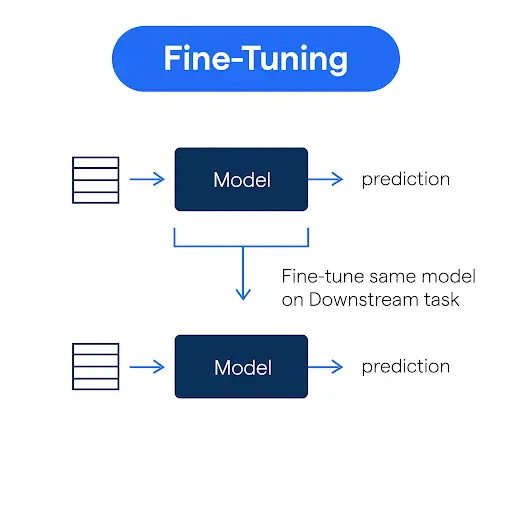
Refining your model to ensure it performs well is essential.
- Fine Tuning: After initial training, fine-tune the model on a specific subset of your data to improve its performance on particular tasks.
For example, if your model is designed to provide tech support, fine-tune it on detailed technical documentation to enhance its accuracy in answering technical queries.
- Testing: Test the model thoroughly to ensure it performs as expected. Use a separate dataset to evaluate its accuracy and make necessary adjustments.
For instance, if your model predicts customer churn, test it on historical data to see how accurately it can identify customers at risk of leaving.
Tools and Platforms
Several tools and platforms can help you build and deploy your custom LLM model.
- TensorFlow and PyTorch: These are popular frameworks for building and training machine learning models. They offer extensive libraries and tools for developing complex models from scratch.
If you’re developing a natural language processing tool, these frameworks provide robust support for handling large datasets and complex model architectures.
- Hugging Face Transformers: This library provides pre-trained models and tools for fine-tuning them. It’s ideal for those who want to leverage existing models and customize them for specific tasks.
For instance, if you’re creating a sentiment analysis tool, Hugging Face offers models that can be easily adapted to your dataset.
- Google Cloud AI and AWS AI Services: These platforms offer cloud-based tools for training and deploying models. They provide scalable resources, making it easier to handle large datasets and intensive computations.
If you’re building an AI-driven customer service platform, these services can help you deploy and manage your model efficiently.
Custom LLM Models in Business
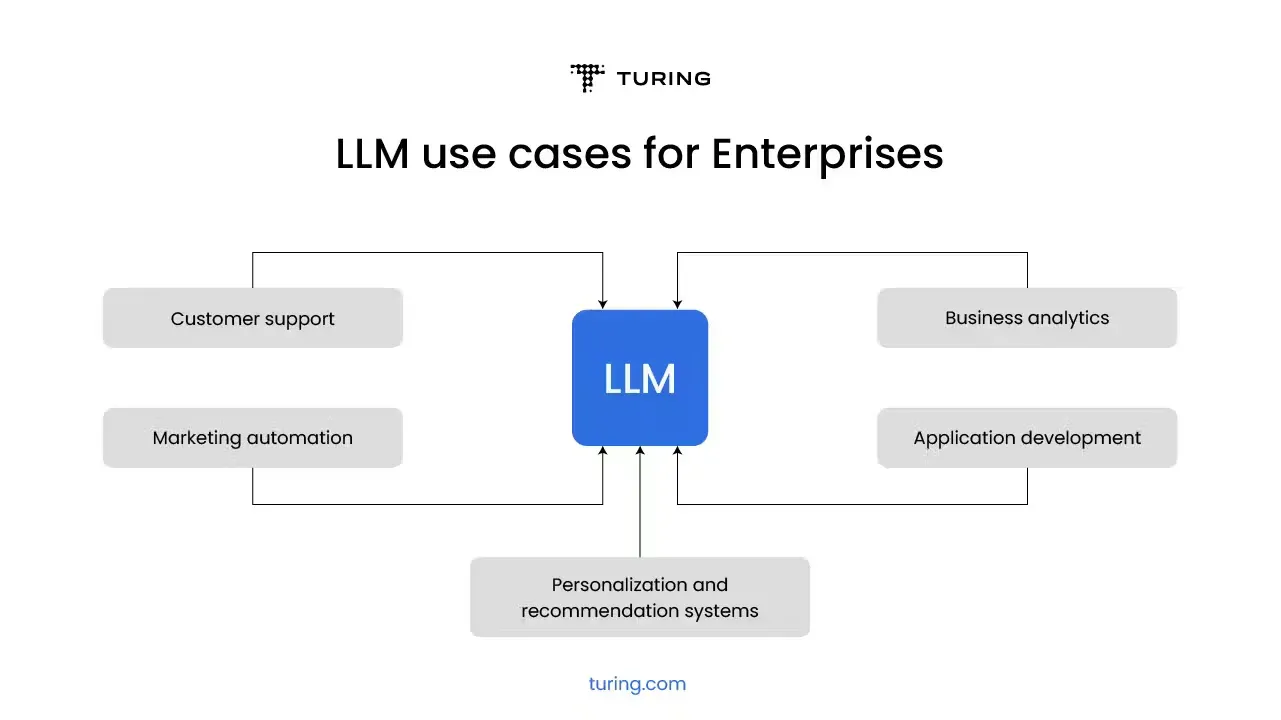
Custom LLM models are transforming various industries by offering tailored solutions that enhance efficiency and drive growth.
By leveraging these advanced AI tools, businesses can streamline operations, improve customer interactions, and make data-driven decisions.
Applications of Custom LLM Models in Various Industries
Custom LLM models are versatile and can be applied in multiple sectors to address specific needs and challenges.
- Customer Service Automation: Many businesses use custom LLM models to automate customer service. These models can handle common queries, provide instant responses, and escalate complex issues to human agents.
For example, a telecom company might use a custom LLM model to manage billing inquiries, reducing the workload on their support staff and improving response times.
- Personalized Marketing: Marketing teams leverage custom LLM models to create personalized content and campaigns. By analyzing customer data, these models can generate targeted messages that resonate with individual preferences.
A retail company could use a custom LLM model to send personalized product recommendations to customers, increasing engagement and sales.
- Predictive Analytics: Businesses use custom LLM models for predictive analytics, helping them forecast trends and make informed decisions. These models analyze historical data to predict future outcomes.
A financial services firm might use a custom LLM model to anticipate market movements and adjust investment strategies accordingly.
Examples of Businesses Successfully Using Custom LLM Models
Several companies have successfully integrated custom LLM models into their operations, demonstrating the potential of these tools.
- Customer Service Automation at a Tech Firm: A technology company implemented a custom LLM model to handle technical support queries. The model was trained on a vast dataset of past interactions and technical documentation.
As a result, it could provide accurate solutions to common issues, freeing up human agents to focus on more complex problems.
- Personalized Marketing by an E-commerce Giant: An e-commerce platform used a custom LLM model to analyze customer behavior and preferences.
The model generated personalized product recommendations and marketing emails. This approach led to a significant increase in customer engagement and repeat purchases.
- Predictive Analytics in Healthcare: A healthcare provider utilized a custom LLM model to predict patient admissions and optimize resource allocation.
By analyzing historical patient data, the model provided insights into peak admission times, helping the provider manage staff and resources more effectively.
Customer Service Automation

Custom LLM models are revolutionizing customer service by automating routine tasks and providing instant support.
- 24/7 Availability: Businesses can offer round-the-clock support without increasing staffing costs.
A travel agency, for instance, can use a custom LLM model to assist customers with booking inquiries and travel updates anytime, improving customer satisfaction.
- Consistency and Accuracy: These models ensure consistent and accurate responses to customer queries.
A financial institution might use a custom LLM model to handle frequently asked questions about loan applications, ensuring that all customers receive the same high-quality information.
Personalized Marketing
Personalized marketing is another area where custom LLM models excel, helping businesses connect with customers on a deeper level.
- Tailored Content: Marketing campaigns can be tailored to individual preferences, increasing their effectiveness.
A fashion retailer could use a custom LLM model to send personalized style tips and product recommendations based on past purchases and browsing behavior.
- Customer Insights: These models provide valuable insights into customer preferences and behavior.
A media company might use a custom LLM model to analyze viewer data and recommend shows or articles, enhancing user experience and loyalty.
Predictive Analytics
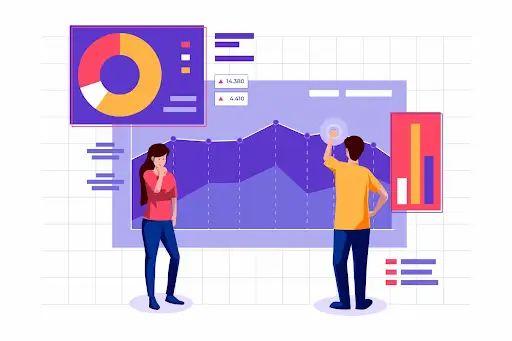
Predictive analytics powered by custom LLM models enables businesses to forecast trends and make proactive decisions.
- Sales Forecasting: Companies can predict future sales trends and adjust their strategies accordingly.
A consumer goods company might use a custom LLM model to analyze past sales data and predict demand for new products, optimizing inventory and marketing efforts.
- Risk Management: Businesses can identify potential risks and mitigate them in advance.
An insurance company might use a custom LLM model to predict claims patterns and adjust premiums, reducing financial risk and improving profitability.
Suggested Reading:
Top 10 Promising Applications of Custom LLM Models in 2024
Benefits of Custom LLM Models for Business Growth
Custom LLM models offer numerous benefits that can significantly drive business growth. These advanced AI tools are tailored to meet specific business needs, enhancing various aspects of operations.
Increased Efficiency and Productivity
Custom LLM models streamline processes and automate repetitive tasks. This leads to higher efficiency and productivity.
For instance, in a customer service setting, a custom LLM model can handle common inquiries, freeing up human agents to tackle more complex issues.
This not only speeds up response times but also improves overall service quality.
Better Customer Insights and Engagement
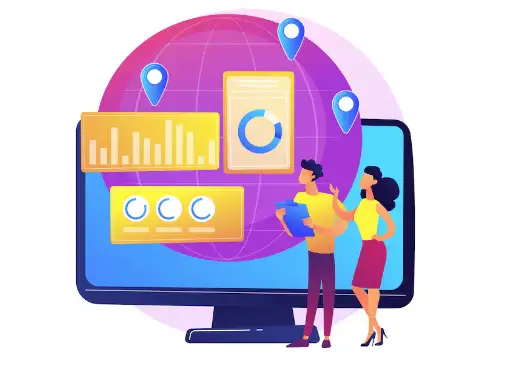
Custom LLM models analyze vast amounts of customer data to provide deeper insights. This helps businesses understand customer behavior and preferences.
A retail company, for instance, can use these insights to create personalized marketing campaigns, resulting in better engagement and higher conversion rates.
Enhanced Decision-Making Capabilities
These models assist in making informed decisions by analyzing trends and patterns.
For example, a financial institution can use a custom LLM model to predict market trends and guide investment strategies.
This leads to more accurate forecasting and better decision-making, giving the business a competitive edge.
Suggested Reading:
Custom LLM Development: Build LLM for Your Business Use Case
Cost Savings and ROI
Implementing custom LLM models can lead to significant cost savings. Automating routine tasks reduces the need for extensive human resources, cutting labor costs.
Additionally, the improved efficiency and productivity lead to better ROI.
For example, a manufacturing company using a custom LLM model for predictive maintenance can reduce downtime and maintenance costs, resulting in substantial savings.
Challenges and Considerations of Custom LLM Models
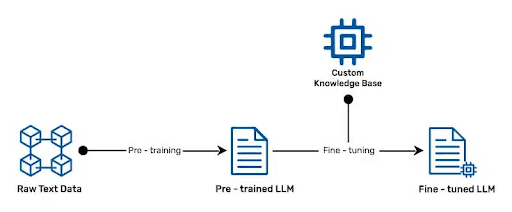
While custom LLM models offer many benefits, there are also challenges and considerations to keep in mind.
Potential Challenges in Building and Implementing Custom LLM Models
Building and deploying custom LLM models involves several technical challenges.
One major challenge is the need for large datasets to train the model effectively. Collecting and processing this data can be time-consuming and costly.
Additionally, the complexity of the models requires significant computational resources and expertise to develop and maintain.
Ethical Considerations
Ethical issues arise with the use of custom LLM models. These models can inadvertently reinforce biases present in the training data.
Ensuring fairness and avoiding discrimination is crucial. Businesses must regularly audit their models to identify and mitigate any biases.
Transparency in how the models are used and making sure they align with ethical standards is essential.
Ensuring Data Privacy and Security

Protecting customer data is a top priority when using custom LLM models.
Ensuring data privacy and security involves implementing robust measures to protect against data breaches and unauthorized access.
Businesses must comply with data protection regulations and standards. This includes anonymizing data where possible and securing data storage and transmission.
Future of Custom LLM Models in AI
The future of custom LLM models in AI is bright and full of potential. As technology advances, these models will become even more integral to business operations.
Emerging Trends and Technologies
The development of custom LLM models is being driven by several emerging trends and technologies.
- Improved Model Architectures: New model architectures are being developed to enhance the performance and efficiency of custom LLM models.
These advancements make it easier to build a large language model (from scratch) that is more accurate and faster.
- Integration with IoT: The Internet of Things (IoT) is increasingly being integrated with custom LLM models. This allows businesses to analyze real-time data from various devices, improving operational efficiency.
For example, a smart factory might use custom LLM models to analyze data from sensors and optimize production processes.
- Edge AI: Edge AI is becoming more prominent, allowing custom LLM models to operate on local devices rather than relying on cloud computing.
This reduces latency and improves data privacy. A healthcare provider, for instance, can use edge AI to analyze patient data locally, ensuring faster and more secure diagnostics.
Suggested Reading:
Top 10 Best Tools for LLM Development in 2024
Potential Future Applications
The potential future applications of custom LLM models are vast and varied.
- Healthcare: Custom LLM models can revolutionize healthcare by providing personalized treatment plans and predictive diagnostics.
A hospital might use these models to predict patient outcomes and tailor treatments accordingly.
- Finance: In finance, custom LLM models can be used for fraud detection, risk management, and personalized financial advice.
A bank could implement these models to monitor transactions for unusual patterns, reducing fraud and enhancing security.
- Education: Custom LLM models can transform education by providing personalized learning experiences.
An online education platform might use these models to tailor content to individual learning styles and track student progress more effectively.
The Evolving Role of AI in Business
AI, particularly through custom LLM models, is becoming an indispensable part of business strategy.
- Automation of Complex Tasks: Businesses are using AI to automate complex tasks that were previously handled manually. This not only increases efficiency but also reduces errors.
For instance, a logistics company might use AI to optimize route planning and inventory management.
- Enhanced Customer Experiences: AI is enhancing customer experiences by providing personalized interactions and support.
A retail company could use custom LLM models to offer personalized shopping recommendations and improve customer service.
- Data-Driven Decision Making: AI enables businesses to make data-driven decisions with greater accuracy.
By analyzing large datasets, custom LLM models provide insights that guide strategic planning and operational improvements. A marketing team might use these insights to tailor campaigns and maximize ROI.
Conclusion
In conclusion, custom LLM models are poised to be a game-changer in the AI landscape, offering unparalleled opportunities for businesses to drive growth and innovation.
By tailoring these models to specific needs, companies can unlock new levels of efficiency and insight. Custom LLM models in AI are not just a trend, but a strategic necessity for organizations looking to stay competitive in an increasingly AI-driven world.
Building a large language model from scratch, while challenging, allows for complete control over the model's capabilities and biases.
This level of customization ensures that the AI aligns perfectly with an organization's goals and ethical standards. Custom LLM models examples across various industries demonstrate their versatility and potential for transformative impact.
Platforms like BotPenguin are at the forefront of this revolution, offering tools and services that make it easier for businesses to implement custom LLM models in AI. BotPenguin's user-friendly interface and robust capabilities enable even non-technical users to harness the power of custom AI models.
As we look to the future, the adoption of custom LLM models will likely accelerate, driving innovation across sectors. By embracing these tailored AI solutions, businesses can position themselves for sustained growth and success in the AI-powered future.
Frequently Asked Questions (FAQs)
What are custom LLM models?
Custom LLM models are large language models tailored to meet specific business needs, enhancing various operations like customer service, marketing, and decision-making with AI-driven solutions.
How can custom LLM models increase business productivity?
Custom LLM models automate repetitive tasks, streamline processes, and provide real-time insights, leading to increased efficiency and productivity in various business operations.
What industries benefit most from custom LLM models?
Industries such as healthcare, finance, retail, and customer service benefit significantly from custom LLM models by optimizing processes, personalizing interactions, and improving decision-making.
What are some examples of custom LLM models in use?
Examples include customer service chatbots, personalized marketing systems, predictive analytics tools, and automated content creation, all tailored to specific business needs.
What challenges are associated with implementing custom LLM models?
Challenges include the need for large datasets, ensuring data privacy, managing ethical considerations, and requiring significant computational resources and expertise for development and maintenance.
How do custom LLM models provide ROI for businesses?
Custom LLM models reduce operational costs through automation, enhance customer engagement, and improve decision-making, leading to increased revenue and a substantial return on interest for businesses.

